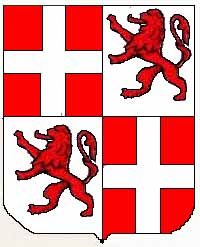
1572-1581
Jean Levesque de la Cassiere, Chief of the language of Auvergne and Grand Marshal of the Order, was elected on the 30th January 1572 as Grand Master rendered vacant by the death of Pietro del Monte.
La Cassiere had gained for himself a very high reputation for his dauntless bravery in saving the colors of the Order in the hard fought day at Zoara, in Africa.
During his career as Grand Master he was fated to witness very turbulent proceedings on the part of the Knights, unprecedented in the history of the Order. He strove hard to settle the countless disputes which had arisen between the Convent and the Bishop of Malta, mostly about the extent of the ecclesiastical jurisdiction of the latter. The matter had to be finally submitted to the Pontiff for decision, and this eventually led to the appointment of a Grand Inquisitor in Malta, a proceeding which was greatly resented by the Order. Another dispute arose in 1575 with the Republic of Venice, anent the seizure of a Venetian galley laden with Jewish goods, which was captured by the Knights of Malta. This affair assumed such great proportions that the loss of the property of the Order within the territories of the Republic seemed imminent, and it was only after the intervention of Gregory XIII, then Sovereign Pontiff, and complete reparation on the part of la Cassiere, that the matter was finally brought to an amicable conclusion.
But one of the greatest sources of discord among the Knights, and of intense displeasure to the Grand Master, was the appointment, through the intrigues of the King of Spain, of the Archduke Wenceslaus of Austria to the Grand Priory of Castile and Leon and the .Bailiwick of Lora. This interference on the part of the King caused such irritation among the Castilian Knights, that they openly rebelled against this appointment, for which act of insubordination they were ordered by the Pope to publicly apologize before the Grand Master and Council. A spirit of veiled mutiny, however, reigned in the Convent, and in 1581 it broke out more powerfully than ever against la Cassiere as the alleged source of all their dissatisfaction. The French Knight Romegas, Prior of Toulouse, was elected by the mutineers to the post of Lieutenant to the Grand Master, and la Cassiere, after having been deposed from his office, was placed in close confinement in Fort St. Angelo. No sooner had the Pope been informed of this scandalous state of affairs in Malta than he at once dispatched a special envoy to enquiry into the causes which led to this unfortunate insurrection, and at the same time to assume the reins of government of the Order until matters were brought to a favorable issue. Both la Cassiere and Romegas were summoned to appear before the Pontiff and personally plead their cause. La Cassiere, on his arrival in Rome on the 26th October 1581, was treated every mark of deference and respect, his entry into the city being attended with the greatest pomp and ceremony. This was done by special wish of Gregory XIII. in order to show his esteem for the Grand Master, and, as a mark of sympathy for the unwarrantable treatment he had received. Romegas, however, was treated with the greatest coolness on every side, and unable to support this blow to all his hopes and aspirations he sank beneath it and died on the 4th November of that same year. La Cassiere was most honorably acquitted of the malicious charges alleged against him, and restored to the dignity which had been so unjustly wrested from him. He did not, however, survive to resume the duties of his office. While still in Rome he succumbed on the 21st December 1581 at the advanced age of seventy eight years. His body was conveyed to Malta and interred in the Conventual. Church of St. John the Baptist, which during his reign he had constructed at his own expense and munificently presented to the Order.